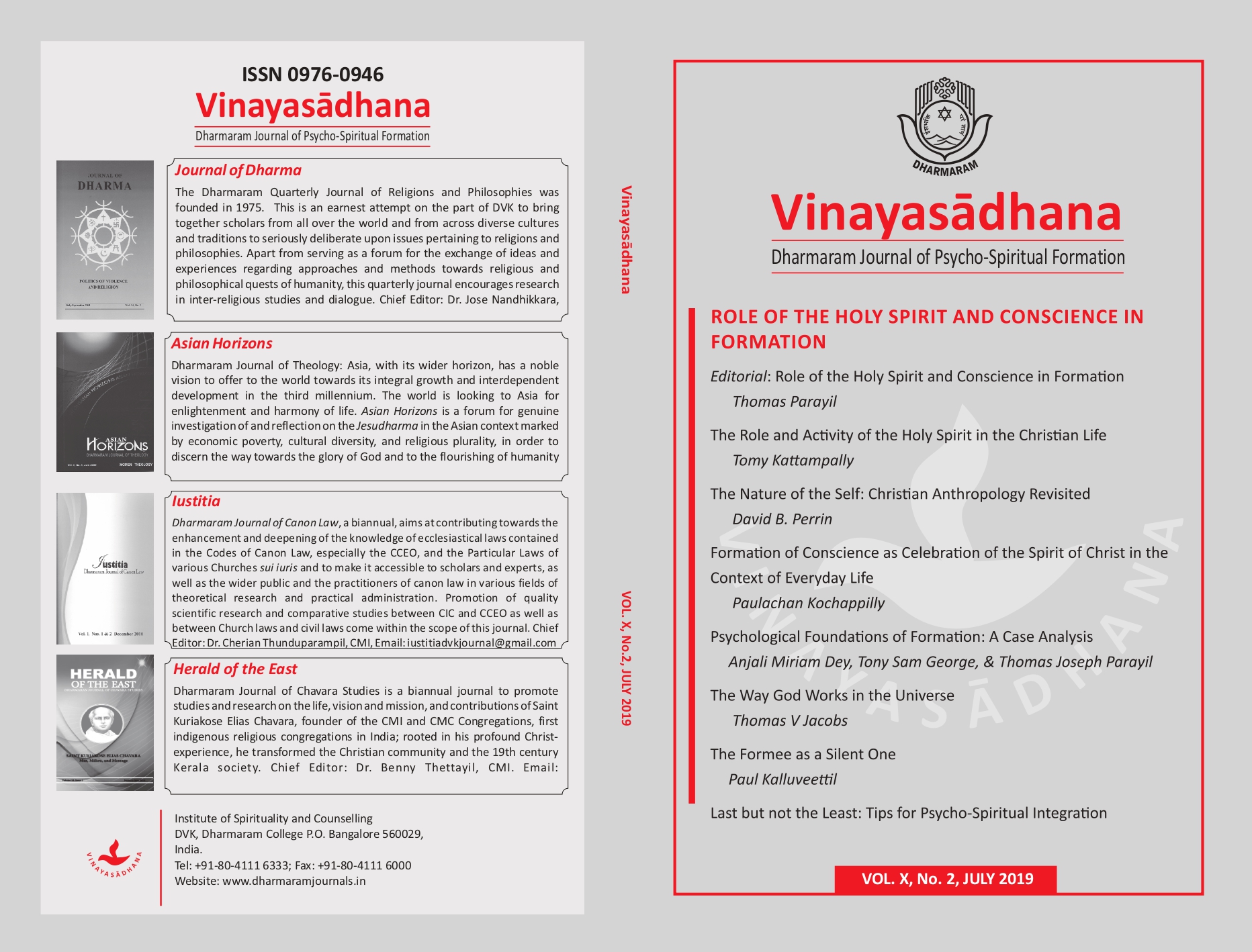Psychological Foundations of Formation
A Case Analysis
Keywords:
Counseling, Spiritual direction, Psycho-spiritual formation, Case analysisAbstract
A case analysis approach is used to illustrate how psychological theories can be used to explain the challenges faced in the formation. The psychological theories explaining the attachment styles, relationships, patterns in communication are used to understand the case of a formee who is facing the challenges that accompany the process of formation. The aspect of psychospiritual formation is reflected throughout the article and suggestions to formators about how to deal with similar issues are also discussed. In conclusion, the article reflects the need for formators to understand the interface between psychology and spirituality and its integration in the seminary to achieve a holistic approach for healing and personal growth of the formee.
References
Benner, D. G. (1998). Care of Souls: Revisioning Christian nurture and counsel. Grand Rapids, Michigan: Baker Books.
Brennan, K. A., Clark, C. L., & Shaver, P. R. (1998). Self-report measurement of adult romantic attachment: An integrative overview. In J. A. Simpson, & W. S. Rholes (Eds.), Attachment theory and close relationships (pp. 46-76). New York: Guilford Press.
Catechism of the Catholic Church. (1997). Catechism of the Catholic Church: Revised in Accordance with the Official Latin Text Promulgated by Pope John Paul II. Vatican City: Libreria Editrice Vaticana.
Cozolino, L. (2014). Attachment-based teaching: Creating a tribal classroom (The Norton series on the social neuroscience of education). W. W. Norton & Company.
Davis, A. S. (Ed). (2011). Handbook of pediatric neuropsychology. New York, NY: Springer Publishing Company, LLC.
Eysenck, M. W. (2015). AQA psychology: AS and A-level year 1 (6th ed.). New York: Psychology Press.
Ferch, S. R. (2012). Forgiveness and power in the age of atrocity: Servant leadership as a way of life. Plymouth, UK: Lexington Books.
Jennings, T. R. (2017). The God-shaped brain: How changing your view of God transforms your life. Downers Grove, IL: InterVarsity Press.
John Paul II (Pope). (1992). Pastores Dabo Vobis. The post-synodal apostolic exhortation on the formation of priests in the circumstances of the present day. Boston: Saint Paul Books and Media.
Kanninen, K., Salo, J., & Punamaki, R-L. (2000). Attachment patterns and working alliance in trauma therapy for victims of political violence. Psychotherapy Research, 10(4), 435- 449. doi: 10.1093/ptr/10.4.435
Kirk, I. B. (2015). Improve your relationships EQ by improving your attachment style. Falls Church, VA: Lulu Press, Inc.
Kolb, B., & Muhammad, A. (2014). Harnessing the power of neuroplasticity for intervention. Frontiers in Human Neuroscience. doi: 10.3389/fnhum.2014.00377
Lerner, H. (2014). The dance of anger: A woman’s guide to changing the patterns of intimate relationships. New York: Harper Collins.
Maddix, M. A., & Blevins, D. G. (Eds). (2016). Neurosceince and Christian formation. Charlotte, North Carolina: Information Age Publishing, Inc.
Maltzman, S. (Eds.). (2016). The Oxford handbook of treatment processes and outcomes in psychology: A multidisciplinary biopsychosocial approach. New York, NY: Oxford University Press.
McCullough, M. E., Pargament, K. I., & Thoresen, C. E. (Eds). (2000). Forgiveness: Theory, research and practice. New York, NY: The Guilford Press.
Ogden, P., & Fisher, J. (2015). Sensorimotor psychotherapy: Interventions for trauma and attachment. Fifth Avenue, New York: W. W. Norton & Company, Inc.
Pettit, P. (Eds.). (2008). Foundations of spiritual formation: A community approach to becoming like Christ. Grand Rapids, MI: Kregel Academic & Professional.
Rasheed, J. M., Rasheed, M. N., & Marley, J. A. (2010). Family therapy: Models and techniques. New York: SAGE Publications.
Satir, V. (1972). Peoplemaking. University of Michigan: Science and Behavior Books.
Serrat, O. (2017). Understanding and developing emotional intelligence. In Knowledge Solutions. Springer: Singapore, pp. 329-339. Retrieved from https://link.springer.com/chapter/10.1007/978-981-10-0983-9_37
Tisdale, T. C., Doehring, C. E., & Lorraine-Poirier, V. (2004). Three voices, one song: Perspectives on the care of persons from a psychologist, spiritual director and pastoral counselor. In G. W. Moon, & D. G. Benner, Spiritual direction and the care of souls: A guide to Christian approaches and practices. Downers Grove, Illinois: InterVarsity Press.
Worthington, E. L. (2006). Forgiveness and reconciliation: Theory and application. New York: Taylor & Francis Group.


